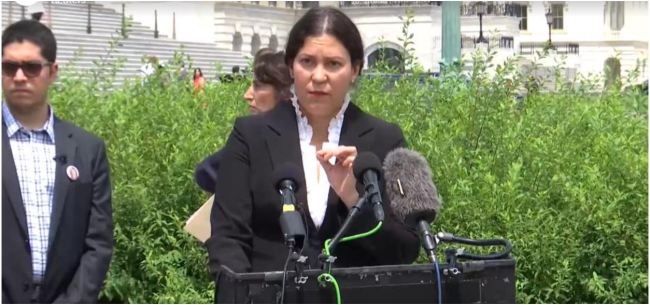On Thursday, CPJ joined the family of slain Palestinian American journalist Shireen Abu Akleh and U.S. lawmakers for a press conference to call for an independent, U.S.-led investigation into her killing. Also this week, CPJ called on U.S. officials to act after Blinken met with Abu Akleh’s family. “Today, we remind President Biden of his own global commitments, his pledge to champion democracy and a free press as a cornerstone of a world where the collective fabric of facts matters,” said CPJ Advocacy Director Gypsy Guillén Kaiser at the press conference. “If Biden’s words at his inauguration: to lead by ‘the power of our example,’ are true, then anything less than a full investigation into Shireen’s killing, is simply unacceptable.” Read Guillén Kaiser’s full remarks here, and watch the press conference here.
Read an op-ed by Lina Abu Akleh, Shireen’s niece, for The Washington Post on why the U.S. must end Israel’s impunity and investigate the journalist’s killing.
At least 19 journalists have been killed in Israel and the occupied Palestinian territories since 1992. In 18 of those cases, the suspected source of fire was Israeli military officials. And 16 of those killed were Palestinians. No one has been held to account.
Global press freedom updates
- Mexican journalist Rubén Haro survives shooting attempt in Ciudad Obregón
- CPJ alarmed at reports that Egyptian authorities have denied imprisoned journalist Alaa Abdelfattah contact with his family
- Sri Lankan security forces detain, assault journalists covering political unrest
- East Timor authorities investigate journalist Raimundos Oki over reporting on alleged police abuses
- Car used by Italian journalist Francesco Digiorgio damaged in arson attack
- Russian shelling damages office of Zorya newspaper in Ukraine
- Nigerian police arrest, briefly detain 5 staff members of Peoples Gazette in Abuja
- Ugandan authorities investigate 4 journalists in murder case, charge and jail 2
- Kazakhstan journalist Olesya Vertinskaya threatened, beaten
- CPJ joins call for Maldives to repeal or amend a provision of the recently ratified Evidence Act, which allows courts to compel journalists and media organizations to reveal their sources on the basis of vague and overly broad terms of “terrorism” and “national security”
- Journalists barred from covering Zimbabwean first lady
Spotlight
People rally in support of Russian journalist Ivan Golunov, who was detained by police, accused of drug offenses, and later freed, in Saint Petersburg, Russia, on June 12, 2019. (Reuters/Anton Vaganov)
Since the outset of the Russian invasion of Ukraine, CPJ Emergencies has been responding to the needs of journalists in Russia as they sought to navigate—or in some cases escape—an increasingly hostile environment.
The introduction of new amendments to the country’s criminal and administrative codes in March marked the beginning of a new and dangerous era for journalists and media outlets operating in Russia, now threatened with fines and lengthy prison terms for disseminating “fakes” or any information that Russian authorities deem to be false.
CPJ and TrustLaw of Thomson Reuters Foundation have published a guide explaining these new laws relating to “fake news” in Russia and how they’ve been applied thus far to both local and international press.
We need your input! CPJ and the Global Reporting Centre at the University of British Columbia are collaborating on a survey on disinformation and harassment targeting journalists. The survey will take approximately 15-20 minutes to complete, and all your responses will be anonymous by default. Take the survey here.
What we are reading (and watching)
- How Ukrainian media can survive Russia’s war – Atlantic Council
- Maria Ressa wants to save journalism – Ravi Agrawal, Foreign Policy
- Sri Lanka’s fallen president and the press – Jon Allsop, Columbia Journalism Review
- Why visa privilege is a press freedom issue – Tina Lee, Unbias the News
- Tunisia: Adoption of new constitution marks a setback for human rights – Amnesty International
- House Intelligence Committee Open Hearing on Commercial Cyber Surveillance – CNET Highlights
- Morocco builds ‘ecosystem of repression’ to quash dissent, report says – Claire Parker, The Washington Post
A closer look | CPJ’s most-read features in July
- Six Kenyan journalists and press freedom advocates on their fears ahead of general elections – Muthoki Mumo/CPJ sub-Saharan Africa representative
- ‘Covering a lawless land’: Brazilian journalists on reporting in the Amazon after Dom Phillips’ and Bruno Pereira’s killings – Renata Neder/CPJ Brazil representative
- ‘Permanent fear’: Togolese journalists on their lives 1 year after Pegasus Project revelations – Jonathan Rozen/CPJ senior Africa researcher
- Frontline diary: A day in the life of a Ukraine war correspondent – Natalie Gryvnyak/CPJ Ukraine consultant
Explore our database of attacks on the press.
